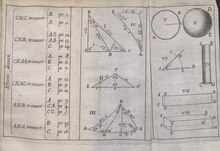Edmund Wingate
Edmund Wingate (baptized June 11, 1596 in Flamborough , Yorkshire ; buried December 13, 1656 in London ) was an English mathematician and lawyer who introduced logarithms in France.
Wingate studied from 1610 at Oxford University (Queen's College) with a bachelor's degree (BA) in 1614 and then pursued a legal career, for which he studied at Gray's Inn in London. In 1624 he went to Paris, where he was the English teacher of Henrietta Maria of France . There he brought the French mathematicians news about the logarithm tables by Henry Briggs (in 1626 he published the first book on logarithms in France - which had to be done in a hurry because others were already working on a publication, a little later logarithm tables by Denis Henrion appeared ) and about the Slide rule by Edmund Gunter . In the English Civil War he was on the side of Parliament and was Justice of the Peace for the county of Bedford. As a friend of Oliver Cromwell , he was a member of a commission that took action against unpleasant ministers. 1654/55 he sat for Bedford in Parliament.
In 1628 he married a landlady and had five sons and two daughters with her.
Several writings on logarithms come from him:
- L'usage de la règle de proportion en arithmétique, Paris, 1624
- English edition: The Use of the Rule of Proportion, London, 1626, 1628, 1645, 1658, 1683 (on Gunter's slide rule)
- Arithmetique Logarithmetique, Paris, 1626
- English edition: Logarithmotechnia, or the Construction and Use of the Logarithmeticall Tables, London, 1635 (Briggs logarithm tables)
- The Construction and Use of the Line of Proportion, London, 1628
- Of Natural and Artificiall Arithmetique, London, 1630, 2 volumes (in order to make it a complete textbook of arithmetic, the 2nd edition was edited by John Kersey under Wingate's supervision in 1650 and the second volume edited by Wingate in 1652). Many more editions appeared up to 1760.
- Ludus Mathematicus, London, 1654, 1681 (the book describes an instrument based on logarithms, but no illustration)
- The Clarks Tutor for Arithmetick and Writing… being the remains of Edmund Wingate, London, 1671, 1676.
He also published legal books:
- Statuta Pacis: or a Perfect Table of all the Statutes (now in force) which any way concern the office of a Justice of the Peace, London, 1641, 1644 (under the initials EW)
- An Exact Abridgment of all the Statutes in force and use from the beginning of Magna Carta, London, 1642, 1655, 1663 (continued by William Hughes) and more often until 1708
- Justice Revived: being the whole office of a country Justice of the Peace, London, 1644, 1661
- The Body of the Common Law of England, London, 1655 and more often
- Maximes of Reason, London, 1658
- In 1640 he published an edition of the Britton (a collection of laws).
Further is from him:
- The Use of a Gauge-rod, London, 1658
- The Exact Constable with his Original and Power in the Office of Churchwardens, London, 1660, 1682
literature
- BP, Dictionary of National Biography , Online entry
| personal data | |
|---|---|
| SURNAME | Wingate, Edmund |
| BRIEF DESCRIPTION | English mathematician and judge |
| DATE OF BIRTH | baptized June 11, 1596 |
| PLACE OF BIRTH | Flamborough |
| DATE OF DEATH | buried December 13, 1656 |
| Place of death | London |
